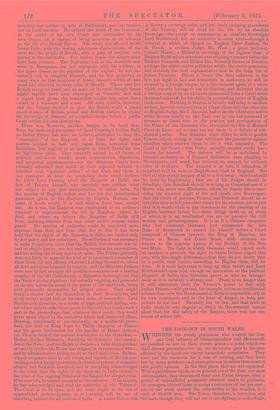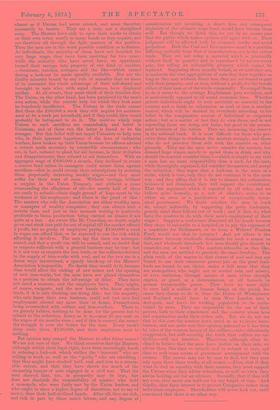THE LOCK-OUT IN SOUTH WALT'S.
WHETHER the ninety gentlemen who control the Iron and Coal industry of Glamorganshire and Monmouth are justified or not in their recent action—a point which we shall discuss presently—we can see no course open to the men affected by the Lock-out except immediate submission. They have not the resources for a war of waiting, and they have lost by many accidents and some grievous blunders their control over public opinion. In the first place, they are not organised. With a pettishness which, as we pointed out at the time, was most unreasonable, they denounced their own Union because, after a period of unparalleled prosperity attained under its guidance, its managers advised them to accept a reduction of ten per cent., and in one week quitted the corporation to the number, it is said, of 60,000 men. The Union, therefore, is powerless, and the men, though they will not see it, are fighting as individuals,
almost as if Unions had never existed, and must therefore necessarily be beaten. They are a mob, not a disciplined army. The Masters have only to open their works to obtain on their own terms nearly as many hands as they require, and are therefore all through the fight masters of the position. Then the men are in the worst possible condition as to finance. As individuals, the majority of them have not hoarded the very large wages they have been receiving for two years ; while the minority who have saved have, we apprehend, turned their savings into property of one kind or another, —furniture, watches, cottages, and the like--which cannot during a lock-out be made speedily available. Nor are the thrifty minority bound by any rule of morality that we know of to surrender the whole advantage of their self-denial and foresight to men who, with equal chances, have displayed neither. At all events, they must think of their families first. The Union, on the other hand, has been paralysed by the men's own action, while the outside help for which they look must be hopelessly insufficient. The Unions in the trade cannot find them the £50,000 a week they will require for mainten- ance at 8s. a week per household, and if they could, they would probably be indisposed to do it. The motives which urge Unions to such sacrifices are comradeship and belief in Unionism, and of these two the latter is found to be the stronger. But this belief will not impel Unionists to help men who, in their ignorant impatience of the laws of industrial warfare, have broken up their Union because its officers advised a retreat made necessary by irresistible circumstances ; who are, in fact, reduced to plead for aid because, in their irritation and disappointment, they refused to aid themselves. With an aggregate wage of £600,000 a month, they declined to create a reserve fund unless its managers could secure them against sacrifices—that is, could recoup their subscriptions by securing them perpetually increasing weekly wages—and they must suffer for their want of sense. Without savings, without a surplus in the Union Treasury, and without a cause commanding the allegiance of all—for nearly half of them are ready to submit—their single ground of hope must be the weakness of the employers ; and where is the proof of that ? The masters who rule the Association are either wealthy men, or managers of wealthy companies ; they can always wait a certain time, and just at this moment waiting is positively profitable to them, production being carried on almost if not quite at a loss. An owner like Mr. Crawshay, no doubt, might go on and stack iron paid for out of capital till the market offered a profit, but no group of employers paying £150,000 a week in wages can afford that, or be expected to run the risk which affording it involves. The men say the facts are misrepre- sented, and that a profit can still be earned, and no doubt that as respects collieries with a general business may be true ; but it is not true as respects the iron trade, or the collieries devoted to the supply of iron-works with coal, and as the two are in a dozen ways intertwined, a speedy break-up of the Masters' Association is impossible. No doubt time would do it, because time would allow the sinking of new mines and the opening of new iron-works, but the men have not placed themselves in a position to obtain the advantage of delay. They have not saved a treasure, and the employers have. They might, of course, emigrate, and the new hands who know another trade, if it is only ditching, are doing this ; but the majority, who only know their own business, could not just now find employment abroad any more than at home, Pennsylvania being overstocked with colliers and iron-workers. There is, we gravely believe, nothing to be done for the present but to submit to the reduction, heavy as it is,—near 30 per cent, on the wages of six months since ; and if this is correct, the sooner the struggle is over the better for the men. Every week's delay costs them £150,000, and their employers next to nothing.
But opinion may compel the Masters to offer fairer terms ? We are not sure of that. We think ourselves that the Masters, although within their legal right, have been exceedingly harsh in ordering a lock-out which strikes the " innocent " who are willing to work, as well as the " guilty " who are unwilling ; that they might have stacked both coal and iron to a reason- able extent, and that they have shown too much of the unsparing temper of men engaged in a civil war. That the men showed that, too, in prosperity may be true, but does not diminish the responsibility of masters who hold a monopoly, who were fairly met by the Union leaders, and who ought to show a higher degree of discretion, not to say of mercy, than their half-civilised hands. After all, they are rich, and rich in part by these men's labour, and any degree of consideration not involving a direct loss, and consequent depletion of the ultimate wage fund, would have become them well. But though we think this, we are by no means sure that the public which makes opinion will agree with us. Their judgment will be affected both by economic truths and social prejudices. Both the Coal and Iron-masters stand in a position differing radically from that of manufacturers, say in the cotton trade. They are not using a material which is practically without limit in quantity and is reproduced by nature every year, but selling an exhaustible property which cannot be replaced. Supposing them morally bound, as we hold they are, to maintain the vast aggregations of men they draw together, so long as they may without direct loss, they are not bound to part with their property, coal or iron, without a profit, for the benefit either of their men or of the whole community. To compel them to do it seems to the average Englishman pure socialism, and is undoubtedly opposed to all sound economic laws. Whether private individuals ought to own materials so essential to the country and so liable to exhaustion as coal or iron is another matter, which will be decided by everybody according to his belief in the comparative success of individual or corporate action ; but as a matter of fact they do own them, and in not expending them are doing, not harm, but good to the perma- nent interests of the nation. They are increasing the reserve in the national bank. It is most difficult for those who per- ceive these things to condemn the masters strongly, and those who do not perceive them side with the masters on other grounds. They say the men never consider the masters, but demand huge wages, merely to spend them in drink, and why should the masters consider them ?—which is simply to say that a man has no more responsibility than a mob, for the men, while thoroughly organised, did consider the masters, and accept the reduction ; they argue that a lock-out is the same as a strike, which is true, only they do not condemn it in the same way ; and they affirm that it is fair to dismiss the submissive, because if not dismissed, they will support the recalcitrant. That last argument, which is repeated on all sides, and we believe quite honestly, as a sort of clincher, seems to us either an error or a justification of exceptionally tyran- nical government. We doubt whether the men in work do, except indirectly, by supporting the petty tradesmen, greatly assist their fellows out of work ; and if they do, what have the masters to do with their men's employment of their wages ? Suppose a coal-owner dismissed all his hands because they chose to subscribe to a hospital, or to pay the expenses of a candidate for Parliament, or to form a Widows' Pension Fund, would not that be tyranny ? And yet where is the difference between wholesale dismissals for such a reason as that, and wholesale dismissals lest men should give dinners to comrades out of work ? The masters subscribe as they like, and the men are entitled to precisely the same freedom. The plain truth of the matter is, that owners of coal and iron are bound to use their enormous powers just as the great land- lords are bound to use theirs, under a full sense that they are monopolists, who ought not to scatter ruin and misery, or even confusion, through masses of men, either through caprice, or greed, or a determination at all hazards to possess irresponsible power. They have no more right to turn half a million of human beings on the parish be- cause they choose to do it, than the Dukes of Westminster and Portland would have to turn West London into a deer-park, and leave its working population to be main- tained by rates. They are responsible for the use of their powers, both to their consciences and the country whose laws and organisation make their riches safe. But we do not see that in this case the masters have acted so as to invite inter- ference, and are quite sure that opinion, poisoned as it has been by tales of the wanton luxury of the colliers—tales ridiculously exaggerated, but still covering the truth that colliers are un- thrifty—will not interfere. Therefore, although often in- clined to believe that the men have justice on their side, we advise them this time to submit, and to submit at once, and then to seek some means of permanent arrangement with the owners. The means may not be easy to find, but they may rely upon these three truths, at all events :—First, that if they want to deal on equality with their masters, they must support the Unions when they advise reductions, as well as when they advise holding out for an advance. Secondly, that if they will not save, they never can hold out for any length of time. And thirdly, that their interest is to protect Companies rather than individual employers. Shareholders will never lock out, until convinced that there is no other way.



































 Previous page
Previous page